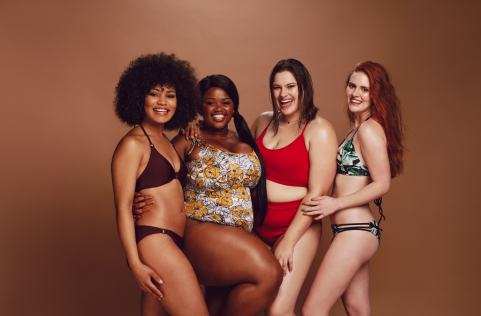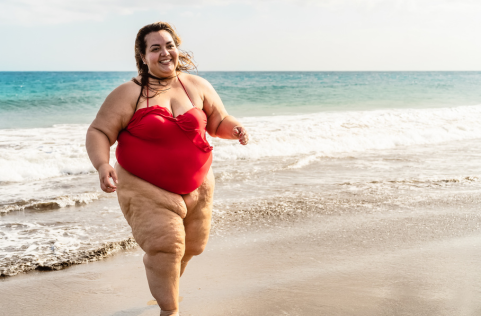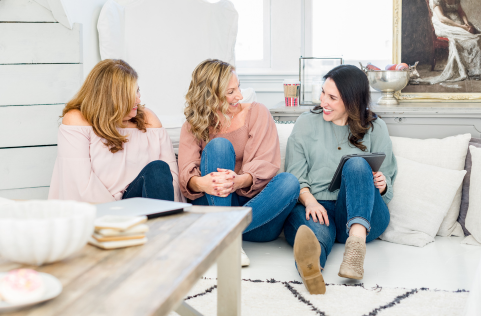I don’t know what your social feeds look like, but every time I log into my Instagram account I find post after post filled with body positive, #bopo hashtags and people professing the love they have for their bodies. While I’m all for self love as a clinician, I worry about the flip side to this...what if you don’t feel this way about your body? Are you wrong for not having body positivity?
Nope! It’s totally normal to not love 100% of yourself 100% of the time. These feelings reflect where you are at in your journey and may ebb and flow day-to-day depending on a myriad of things such as stress, sleep, digestion, mood, time of year, your cycles…I could go on.

what is body positivity?
Body Positivity is a phrase that gets thrown around frequently, but what does it really mean to be “body positive?”
Body Positivity is a movement that believes you should love your body and have a positive body image regardless of your size, form or shape.
Sounds great right? Sure, but perhaps it’s a bit unrealistic.
Living in the human body can be an uncomfortable experience at times. It just is. Just like it’s normal human nature to compare ourselves to others’, to be critical of our bodies, and to have bad body days. You are not wrong for feeling this way!
And this, my friends, is why I prefer to practice body acceptance instead.
body acceptance: body positivity with self-compassion
The goal of body acceptance is to respect and appreciate your body for the way it is, while also understanding that we are going to have days where we don’t feel great in our own skin.
Body acceptance takes into consideration the not so body positive days we might experience. Instead of punishing ourselves with extreme diets or excessive exercise because we’re feeling like our pants don’t fit like they used to, body acceptance teaches us to ride out the wave of discomfort and continue caring for ourselves.
I liken body acceptance to a marriage. In a marriage (or any other long term relationship) you’re going to go through hard times and great times together. If you are to get angry and try to challenge and fight every nuance that your might be experiencing with your partner, you’re likely not going to have a very happy or healthy marriage! But, if you learn to accept each other’s differences, talk through your frustrations and learn to work together, you’re likely to feel happier - and healthier - in your relationship. Having a relationship with your body is the longest relationship we’ll ever experience. We can either learn to appreciate the ups and downs or we can fight the never-ending, uphill battle against it.

3 ways to find body acceptance
1. Remember set point theory is a thing
Set point theory is essentially how we describe body diversity, and explains why weight loss beyond our natural biological set point, is incredibly difficult, or at best nearly impossible to sustain (95% of dieters gain back the weight they lost, oftentimes more). Essentially, your set point is the weight range where your body functions at its best. It has elaborate mechanisms in place to sustain this range which can fluctuate between 5-20 (yes, 20!) pounds. It also shifts as we age and transition through seasons of life (which is why it’s so harmful to assume we should maintain our lowest adult weight- which was probably in high school or college!).
We are likely at our set point when we aren’t micromanaging our eating or exercise, dieting, obsessing over our weight or using food as our only method of self-soothing.
Attempting to override our set point in order to reach a weight that is unhealthy for your body, is similar to trying to hold a beach ball underwater. We can hold it there for a while, but eventually we wear out from the resistance, let go, and the ball comes exploding out of the water. It’s just not sustainable - or healthy!
This is because our set point is largely determined by our genes. AKA- out of our control, much like our foot size, natural hair color, or personality type. It’s the reason why two individuals eating exactly the same and moving exactly the same amount will have different looking bodies and be different sizes. It’s human biology. It is what it is.It also explains why you can’t tell anything about a person’s health just by looking at them, and the fact that a person doesn’t necessarily need to be underweight to be classified as having an eating disorder if they meet other behavioral markers.
2. Check in on self-weight checking
Oftentimes, the scale can be more self-sabotaging than helpful. If stepping on the scale makes or breaks your day, it’s probably not a good idea. Not only this, but the number on the scale says next to nothing about your health or how well you take care of yourself. This number can be useful for researchers as far as screening and categorizing participants, but it’s usefulness pretty much stops there. The amount of emphasis put on weight is misplaced and unfounded. Start working towards freeing yourself from the scale so that you can stop beating yourself up over an arbitrary, meaningless number.
Imagine the amount of space and energy you would free up by letting go of this number on the scale and shifting your energy towards improvements to health by way of self care, meditation, sleep, and gentle nutrition. Start figuring out what health means to you, with weight out of the picture (hint: it’s so much more than what you eat, your size, how you move your body!).
3. cut yourself some slack
Think about how much of your life you have spent at war with your body? For many of our clients it’s years, even decades. A shift in mindset isn’t going to happen overnight. There is nothing wrong in feeling uncomfortable in your body and you aren’t wrong for not loving every inch of the skin you’re in. You’re not a failure for feeling this way! Be real with yourself, unpack these feelings and be open to conversations about them. How you feel is a completely valid and normal human response. Our bodies need to be continuously cared for, no matter what kind of head space we may be in. Beating yourself up over not feeling so body positive is likely only going to dig you deeper into a spiral of self hatred. By accepting the ebb and flow of body love we help to cultivate a loving and lasting relationship with the body that we’ve been given.

how NourishRX can support you
Remember, body acceptance takes time and practice. Stay committed to the process and don’t forget to remind yourself that it’s okay to feel all the feelings. Ride the wave, we promise it’s worth it. YOU are worth it.
But our team here at NourishRX wants to be there to support you every step of the way! Drop us a line and see how our 1:1 nutrition counseling or other support services best fit your needs.
Comments Off on What is Body Positivity?